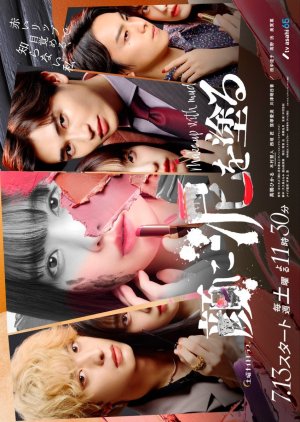
Perfect drama for Healing and getting out of toxic relationships.
This drama carries such a powerful message.The portrayal of toxic relationships is incredibly well done ,everything feels realistic and on point. It clearly shows how narcissistic and manipulative a toxic person can be. Some might see the plot as overly simple, revolving around something as small as putting on lipstick. But the real message goes far beyond that.
It’s not just about lipstick; it’s about living your life on your own terms, pursuing your passions, and doing what makes you happy. Lipstick in this drama symbolizes so much more ..it could represent a career, a hobby, or anything else that defines you. In the end, the person who truly loves you will accept you for who you are.
This drama deserves more appreciation for the deep and meaningful story it tells.
Was this review helpful to you?

This review may contain spoilers
Mix of Warm and Toxic
It has been a while since I watched this drama, but I noticed no one had written a review, so I thought I’d give it a shot, haha!
For starters, anyone who has seen *Colorful Love* will definitely notice some similarities when watching this drama, though with less of the innocence and comedy associated with fairy tale aspects. This drama feels like the other side of the coin. The female lead (FL) is caught between two men: her boyfriend of many years, who viewers quickly discover is not only controlling (the toxic element) but also abusive due to his insecurities and childhood trauma, and another man who serves as a refreshing contrast.
The story explores how, as humans, we often feel the need to fit into predefined boxes or labels to belong—especially in today’s world. If we don’t, society is quick to assign a label to us, regardless of whether it fits. This theme is mirrored in the FL’s boyfriend (the second male lead, or SML). He witnessed his mother, a woman who loved wearing makeup (particularly red lipstick), endure a bad and loveless marriage. She eventually had an affair, got divorced, and abandoned him. This experience left him feeling inadequate and unworthy of love. As a result, he grew into a man obsessed with perfection, order, and control, which led to his toxic behavior toward the FL. When she began exploring her own desires and interests outside their relationship, he became increasingly abusive.
I particularly enjoyed the scenes where the SML was alone. His obsession with "fixing" what he saw as the broken painting of their "perfect" relationship was genuinely terrifying. The actor did an amazing job, especially in those chilling close-ups of his blank expression as he stared at something as mundane as a coffee cup.
On the other hand, the warmth in the story comes from the male lead (ML), Eve. His presence gives the FL a sense of comfort and safety, contrasting sharply with the SML. While this drama and *Colorful Love* are like two sides of the same coin, Eve represents the opposite of Yuki (SML). Eve exudes confidence and security, fully embracing his tastes and desires. His respect for boundaries and understanding of the FL’s situation allows her to grow and move forward in the story.
However, this is also where I feel the story fell short. The FL, Miku, is undeniably the protagonist and the "sun" of the narrative, with everyone else orbiting around her. As a result, the ML, Eve, and even Yuki’s brother (step-brother or half-brother—it’s not entirely clear) felt underdeveloped. The brother, for example, seemed to exist solely as a plot device to "save" the FL and ML, without adding much depth or relevance to the story. At one point, the narrative even hints he might become another love interest for Miku, which goes nowhere.
It often felt like the writers had a bigger story in mind but ran out of episodes to fully explore it. This is particularly evident in the lack of substantial romance. While Miku does confess her feelings for the ML at the end, the realization feels rushed and sudden, as though it was tacked on at the last moment.
Was this review helpful to you?

This review may contain spoilers
Nunca es tarde para ser tu mismo
Como historia, creo que es bastante original. Hay muy pocas series que cuenten la historia de un chico heterosexual travesti (por favor corrijanme si estoy diciendo algo mal). Así que partiendo de ahí, es una serie que definitivamente te ofrece un romance que desafía los romances hetero normativos. Sin embargo la serie trata sobre el amor propio y no tanto sobre el romance. La FL recorre un largo camino para luchar por quien es y alejarse de su pareja tóxica que la limita y la agrede. La historia te muestra un cachito de Japón y de como la sociedad quiere que hagas y estés con quien más te conviene, pero eso no necesariamente tiene que gustarte o hacerte feliz.Es una serie muy bonita que te inspira a luchar por ti, te muestra que a veces el apoyo viene de extraños qué no piden nada a cambio y no de tu familia, y te enseña a ver a la comunidad con otros ojos.
Hay un escena que me gusta mucho en la que Eve esta maquillando a sus compañeras de clase y ellas lo invitan a una pijama porque creen que es una "amiga" , pero el les aclara que aun que le gusta verse femenino no es gay y siempre se refiere a si mismo con pronombres masculinos, incluso cuando adopta una apariencia completamente femenina. Esa fue una bofetada para toda a esa gente que cree que la expresión de género depende únicamente de la orientación sexual.
Las escenas del prometido tóxico a veces son un poco cringe y su trauma realmente no me hizo sentir nada. Sin embargo, la FL compensa bastante bien las carencias del ML y te muestra a una mujer destrozada y en conflicto por no ser entendida.
Por favor ve la serie, no te arrepentirás.
Was this review helpful to you?

This review may contain spoilers
Mini serie giapponese sull'importanza di piacere a sè stessi: troppa tematica e poca sostanza
Breve drama giapponese incentrato sul tema dell’importanza di piacere a sé stessi piuttosto che di piacere agli altri. Argomento che può essere trattato in modi diversi, qui si sceglie di farlo attraverso il make up, aspetto interessante perché va a capovolgere l’ordinario concetto di “maschera” artificiale che copre un “vero” volto acqua e sapone. Qui, invece, la vera Miku è in realtà quella truccata, e la versione dal volto pulito che conosciamo inizialmente è come il fidanzato la vorrebbe e, di fatto, corrisponde alla versione di una Miku che non ha il coraggio di essere veramente sé stessa.Il drama punta più a trasmettere il concetto della tematica principale, che a costruire una storia nel concreto. Il fidanzato rappresenta l’ostacolo, facendola inizialmente sentire inadeguata se non uniformata alla visione che lui – e, per riflesso, ipoteticamente gli altri – hanno dei lei. In realtà lui non ha un vero e proprio nesso con il topic del drama, è un elemento di disturbo che trova le sue ragioni in un trauma vissuto in tenera età. Eve è un personaggio certamente singolare ed eccentrico, il suo ruolo è quello di fare da stimolo per Miku (il coraggio di Eve, però, è tutto esteriore – quello che a Miku manca – ma, di contro, tra i due è anche quello meno aperto se si va sul piano introspettivo e dei sentimenti).
Riassumendo, abbiamo Miku che rappresenta una tematica in evoluzione, il fidanzato disturbato che le rema contro in un verso ed Eve che cerca di sospingerla nella direzione opposta. Ma, tolto il concetto alla base del drama, una vera e propria trama di fatto non c’è.
A questo si aggiunge un finale sbrigativo e raffazzonato, che ha la pretesa di “sistemare” magicamente tutte le questioni – dall’ex fidanzato ai rapporti familiari, dall’aspetto professionale alla relazione con Eve – in modo davvero poco credibile.
In conclusione, carina la tematica alla base, ma molto discutibile il risultato concreto.
Was this review helpful to you?



































